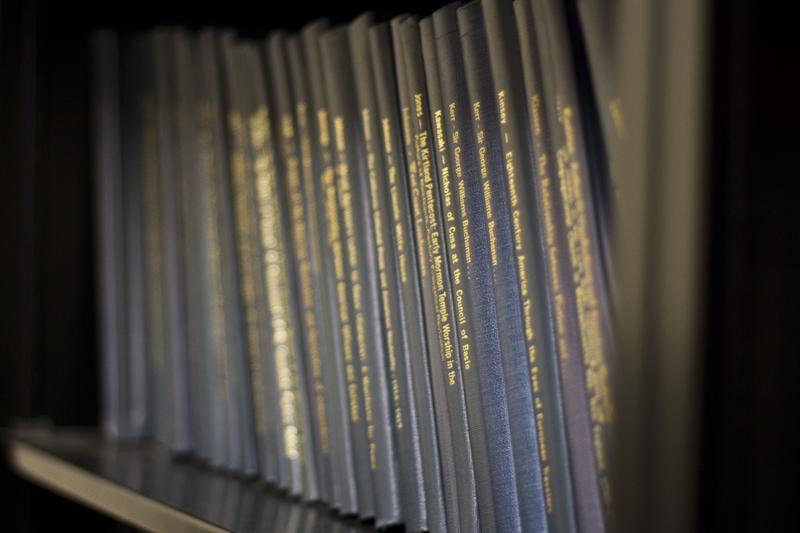This spring semester there are hundreds of undergraduates eagerly awaiting graduation, but Monday marked a graduation of sorts for a smaller group of students. These are the graduate scholars who turned in their master’s theses.

Photo by Dalton Runberg / The Collegian
Contrary to what the name might suggest, completing postgraduate work is not necessarily about mastering a subject. In the opinion of Tim Skeen, a Fresno State professor and coordinator of the Master of Fine Arts program in creative writing, the goal is more realistic.
“It’s an acknowledgement that you’ve taken a certain path and embraced the work to pursue it,” Skeen said.
That commitment varies in length of time to complete a project and the mental and physical skills required.
After three and a half years, William “Billy” Mask II completed his 91-page thesis in the history master’s program about what’s called the “Chilean Miracle,” a series of reforms that contributed to an economic recovery in the country in the 1980’s.
Mask reflected on a process that took years of researching Chilean history to reach a point where he could submit his work for approval.
“Illuminating,” Mask said. “Eye opening. Chile is a proud nation. They’re proud of their history. They’re proud of their system. I’ve enjoyed every minute of it. In fact, I’ve enjoyed it so much that my next great adventure is to go to Chile and stay there for quite some time. I wouldn’t mind teaching there.”
Vanessa Tucker, a student finishing a master degree in biology, did research that took place from June 2011 to May 2012. Tucker studied the ecology of the area around Naval Air Station, Lemoore. This included setting traps for small mammals as part of a biodiversity survey. The task took Tucker and her fellow researchers into freezing temperatures and sweltering conditions on summer days.
“The project itself was physically very intensive,” Tucker said. “You have to go out once a month and spend a whole weekend, Friday to Sunday. It was intense, but fun. Now it’s relief that it’s pretty much done. It felt good I did something out there, and I made a difference in some way.”
Intensity can come in different forms, like a novel of about 240 pages that Brian Dunlap of the creative writing program started in 2011 as his thesis project. He still considers it a fluid product.
“I feel good about my thesis in terms of being accepted for graduation,” Dunlap said. “As a novel for publication, I still need to do a lot more work. The final stretch was stressful since I had not gone through my thesis to correct any spelling or grammar mistakes. Ironically, I stink at grammar, and I had close to 240 pages to edit in about a month’s time.”
The professors who advise postgraduate students and sit on committees evaluating their work try help with time management.
“What we ask them to do, we have done ourselves,” Skeen said. “We understand it’s difficult. We save them time. Every student in our program could do everything on their own without the faculty but it would take them 20 years.”
Brad Jones, a professor with the history department and graduate coordinator, said students who have to turn in their completed work carry a burden their professors share to a certain degree. These professors critically review 50-page theses from multiple students.
“I basically spend February and the first couple weeks of March reading draft after draft after draft of chapters, commenting and meeting with students,” Jones said. “It’s a pretty exhausting time, even for us. It’s really exhausting for the student. I remember those days as a student staying up all night writing. This isn’t casual reading.”
For the students who successfully navigate the path of postgraduate work, few of them consider a Masters degree the end.
“I knew I wanted to teach, but I wanted to teach at the community-college or university level,” Mask said. “Not that I don’t like kids, just that I’ve raised my kids already, and I know how difficult it is to teach high school students.”
Tucker shares the desire to teach but doesn’t want to abandon the other work she enjoys.
“I plan on using my master’s to teach high school or maybe college,” Tucker said. “I am hoping to get a research internship this summer. I always want to stay connected to research.”
Dunlap said the next step is to continue working on his current novel.
“Keep writing and hopefully become a published author,” Dunlap said.





